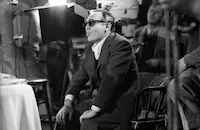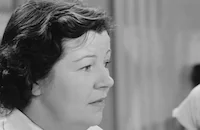Confidentially Connie

Brief Synopsis
Cast & Crew
Edward Buzzell
Van Johnson
Janet Leigh
Louis Calhern
Walter Slezak
Gene Lockhart
Film Details
Technical Specs

Synopsis
When pregnant Connie Bedloe's obstetrician recommends a diet rich in red meat, she sadly replies that her husband's modest salary as a college instructor makes this impossible. While walking home with her friend, Phyllis Archibald, however, Connie is seized by a powerful craving for red meat, and goes into the butcher shop to spend her cigarette allowance on lamb chops. Meanwhile, at Maine's tiny Mather College, Dean Edward E. Magruder tells his staff that poetry teacher Joe Bedloe is one of two candidates for an assistant professorship. That evening, when Joe learns that Connie gave up smoking to buy the lamb chops, he reproaches himself for being a poor provider and says he should quit teaching and go back to work for his estranged father Opie, a cattle rancher in Texas. Connie reassures her husband, but advises him to pursue the promotion more aggressively, pointing out that his rival, the obsequious Simmons, is having a dinner party for Dean Magruder. Meanwhile, at Opie's Texas cattle ranch, where the dinner table is piled high with meat, the gruff old man decides to pay a surprise visit to his son. Connie warmly greets her father-in-law, whom she has never met, and confides that she would like Joe to return to the ranch. Joe refuses to give up the job he loves, however, and tries to convince his father of the importance of teachers. That evening, after their fish dinner, Connie takes the vitamins her doctor prescribed and tells Opie about the baby, and he is appalled by her frugal diet. Visions of fish and vitamins torment Opie's dreams that night, and he wakes in a panic, declaring that Connie must have meat. Opie calls on butcher Emil Spangenberg and enlists his help in a scheme: Opie will tell Connie and Joe that Spangenberg is getting his meat cheap from an overstocked slaughterhouse and is passing the savings on to his customers. Pulling out a hefty bankroll, Opie instructs the butcher to charge Connie half price from now on. When Opie comes home with an enormous sirloin steak, Connie immediately sees through his ruse, but gratefully accepts the meat. Connie throws a dinner party for the dean, who is greatly impressed by the steak. Opie realizes that his son will never come home if he gets the promotion, so he privately tells Dean Magruder that Joe will be returning to Texas at the end of the term. As the guests are leaving, Joe innocently shares the news about Spangenberg's new low prices, and the wives excitedly make plans to stock up on meat the following morning. Opie tracks Spangenberg down at a butchers' convention, and promises to cover his losses if he will keep up the façade until all three women from the dinner party have bought their meat. Word of Spangenberg's discounts gets out, however, starting a price war among the local butchers and driving the entire town into a meat-buying frenzy. Later that day, Joe learns that Simmons got the promotion, and reluctantly agrees to return to the ranch. Just then, a distraught Spangenberg bursts in, telling Opie that the other butchers are blaming him for their losses in the price war. Joe is furious at Opie's meddling, but Connie takes her father-in-law's side. Later, Joe's students come by to give him a going-away present, and when they mention Opie's conversation with the dean, Connie is as angry as Joe. While Opie is packing his bags, Dean Magruder holds a meeting to announce that the college has received an anonymous endowment to be used to raise each teacher's salary by $1,000. Joe goes to the train station and tells his father that he does not want his money, but Opie insists that he set up the endowment for the other professors after seeing their joy at being able to afford meat. That summer, Joe and Connie bring their baby son Opie to visit his grandfather on the ranch.

Director

Edward Buzzell
Cast

Van Johnson

Janet Leigh

Louis Calhern

Walter Slezak

Gene Lockhart
Hayden Rorke

Robert Burton

Marilyn Erskine
Kathleen Lockhart
Arthur Space
Barbara Ruick
June Whitley
Dick Sands
Emmett Lynn
Kathleen O'malley
Emory Parnell
Lotte Stein
Henry Corden

James Flavin
Ralph Reed
Henry Kulky
Phil Tead

Byron Foulger
Gayne Whitman

Kathleen Freeman
Elizabeth Flournoy
Lou Merrill
Hal Smith

Roger Moore

Margaret Bert
Estelle Etterre

Mae Clarke
Crew
Stephen Ames
Peter Ballbusch
Cedric Gibbons
Dr. Brewster M. Higley
Charles Hunt
Ralph Hurst
Dick Kinon
Gertrude Kirkwood
Harry Kress
Harold Lipstein
Percey Montrose
Al Raboch
David Rose
Douglas Shearer
Max Shulman
Max Shulman
Fredrick Y. Smith
Leonid Vasian
Charles Wallace
Edwin B. Willis
Herman Wouk
Dolph Zimmer

Photo Collections
Videos
Movie Clip



Film Details
Technical Specs

Articles
Confidentially Connie
In her autobiography, There Really Was a Hollywood, Leigh wrote "in my new Judy Holiday-style hairdo, I was reunited with Van Johnson in a fetching little comedy, Confidentially Connie. In the six years since The Romance of Rosy Ridge he hadn't changed one adorable freckle, or one endearing quality. He was a father now, of a daughter, Schuyler." Leigh also added, "I loved working with Van and had another opportunity in 1962 on Wives and Lovers.
Although Confidentially Connie was a minor film for both Leigh and Johnson, it was well received by critics and audiences alike with Variety calling it "an entertaining, spritely comedy," and also commenting "The dialog is good, the situations amusing...Miss Leigh and Johnson team excellently."
Producer: Stephen Ames
Director: Edward Buzzell
Screenplay: Max Schulman (screenplay and story)
Cinematography: Harold Lipstein
Art Direction: Cedric Gibbons, Leonid Vasian
Music: David Rose
Film Editing: Fredrick Y. Smith
Cast: Van Johnson (Joe Bedloe), Janet Leigh (Connie Bedloe), Louis Calhern (Opie Bedloe), Walter Slezak (Emil Spangenberg, butcher), Gene Lockhart (Dean Edward E. Magruder), Hayden Rorke (Prof. Simmons), Robert Burton (Dr. Willis Shoop), Marilyn Erskine (Phyllis Archibald), Kathleen Lockhart (Mrs. Martha Magruder), Arthur Space (Prof. Archie Archibald, Barbara Ruick (Barbara), June Whitley (Betty Simmons)
BW-71m.

Confidentially Connie
TCM Remembers Van Johnson - Important Schedule Change on TCM In Honor To Salute VAN JOHNSON
The new schedule for the evening of Tuesday, December 23rd will be:
8:00 PM In the Good Old Summertime
9:45 PM A Guy Named Joe
12:30 AM Thirty Seconds Over Tokyo
2:30 AM The Last Time I Saw Paris
4:30 AM Thrill of a Romance
Van Johnson (1916-2008)
Van Johnson, the boyish leading man whose clean cut, All-American appeal made him a top box-office draw for MGM during World War II, died on December 12 in Nyack, New York of natural causes. He was 92.
He was born Charles Van Dell Johnson on August 25, 1916, in Newport, Rhode Island. By his own account, his early childhood wasn't a stable one. His mother abandoned him when he was just three and his Swedish-born father offered little consolation or nurturing while he was growing up. Not surprisingly, Johnson found solace in singing and dancing lessons, and throughout his adolescence, he longed for a life in show business. After graduating high school in 1934, he relocated to New York City and was soon performing as a chorus boy on Broadway in shows such as New Faces of 1936 and eventually as an understudy in Rodgers and Hart's musical, Too Many Girls in 1939.
Johnson eventually made his way to Hollywood and landed an unbilled debut in the film version of Too Many Girls (1940). By 1941, he signed a brief contract with Warner Bros., but it only earned him a lead in a "B" programmer Murder in the Big House (1941); his contract soon expired and he was dropped by the studio. Johnson was on his way back to New York, but as luck would have it - in the truest Hollywood sense - friends Lucille Ball and Desi Arnaz introduced him to Billy Grady, a lead talent scout at MGM, which was currently Ball's new studio. Johnson was signed up and almost immediately MGM had a star on its hands.
It might have been slow going at first, with Johnson playing able support in films such as Dr. Gillespie's New Assistant and The War Against Mrs. Hadley (both 1942). By 1943 the studio capitalized on his broad smile and freckles and starred him in two of the studio's biggest hits: A Guy Named Joe and The Human Comedy. Those two films transformed him into a boxoffice draw with a huge following, particularly among teenage girls. A near fatal car accident that same year only accentuated the loyalty of his fans, and his 4-F status as the result of that accident created an opportunity for him when so many other leading actors of the era (James Stewart, Clark Gable) were off to war. Johnson was quickly promoted as MGM'sleading man in war heroics and sweet romancers on the big screen: The White Cliffs of Dover, Thirty Seconds Over Tokyo (both 1944), Thrill of a Romance, the episodic Week-End at the Waldorf (both 1945), and a musical remake of Libeled Lady entitled Easy to Wed (1946).
Hits though these were, it wasn't until after the war that Johnson began to receive more dramatic parts and better material such as supporting Katharine Hepburn and Spencer Tracy in the political farce State of the Union (1948). other significant roles included the well-modulated noir thriller The Scene of the Crime, the grim war spectacle Battleground (both 1949), the moving domestic drama Invitation (1952) in which he played a man who is paid to marry a woman (Dorothy McGuire) by her father. Before he left MGM, he closed his career out in fine form with the sweeping musical Brigadoon, co-starring Gene Kelly and Cyd Charisse; and the lilting soaper The Last Time I Saw Paris (both 1954) with Elizabeth Taylor.
After he left MGM, the parts that came Johnson's way weren't as varied, but he had his moments in The Caine Mutiny (1954), the beguiling romance drama Miracle in the Rain (1956) with Jane Wyman; and his lead performance in one of the first successful made for-TV-movies The Pied Piper of Hamelin (1957). By the '60s, Johnson returned to the stage, and played the title role in London's West End production of The Music Man. He then returned to Broadway in the drama Come on Strong. He still had a few good supporting parts, most notably as Debbie Reynolds' suitor in Norman Lear's scathing satire on marital differences Divorce American Style (1967); and television welcomed his presence on many popular shows in the '70s and '80s such as Maude, Fantasy Island, The Love Boat and of course Murder She Wrote. There was one last graceful cameo in Woody Allen's The Purple Rose of Cairo (1985), yet for the most remainder of his career, Johnson worked mainly on the dinner theater circuit before retiring from showbiz completely by the mid-90s. He is survived by a daughter, Schuyler.
by Michael T. Toole
TCM Remembers Van Johnson - Important Schedule Change on TCM In Honor To Salute VAN JOHNSON
Quotes
Trivia
Notes
The working titles of this film were A Steak for Connie and Connie. The order of names in the opening cast credits differs slightly from the order of the end credits. According to Hollywood Reporter news items, Jeff Alexander was originally signed to compose the musical score, but was replaced by David Rose because of conflicts Alexander had with other M-G-M assignments.
A March 19, 1953 article in Daily Variety reports that the Meat Association of America protested the film, claiming that it held butchers and their organizations up to ridicule. Calling Confidentially Connie an "attack" on the meat industry, the Institute asked M-G-M to withdraw the film from distribution and ordered one of its members to cancel a promotional tie-in with a local theater.

Miscellaneous Notes
Released in United States March 31, 1953
Released in United States Spring March 1956
Released in United States Spring March 1956
Released in United States March 31, 1953













